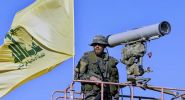
The border demarcation issue between Lebanon and its neighbors—Syria to the north and Israel to the south—is progressing, with France, Saudi Arabia and the US playing key mediating roles. The situation is now more favorable, as long-standing internal and external obstacles have largely dissipated, creating a better climate for finalizing Lebanon's borders.
On March 28, in Jeddah, Saudi Arabia, Lebanese Minister of Defense General Michel Menassa and Syrian Minister of Defense Marhaf Abu Qusra signed an agreement to reaffirm the importance of border demarcation and activate joint committees to address security and military challenges, particularly along the porous border. The two sides agreed to hold a follow-up meeting in Saudi Arabia, contingent on progress in border control, reducing cross-border clashes and halting smuggling.
France has been playing a more prominent role in the talks now that Syria's previous obstruction, driven by self-interest and support for Iran’s agenda of facilitating weapons transfers to Hezbollah, has been removed. French President Emmanuel Macron raised the matter with Syrian President Ahmad el-Chareh during his visit to Paris, emphasizing France’s commitment to countering Hezbollah's influence and improving conditions along the Lebanese-Syrian border. He also signaled France’s readiness to begin formal demarcation talks.
France, in response to Lebanese President Joseph Aoun’s request, provided Lebanon with detailed maps from the 1943 French Mandate era, which clearly delineate the shared border, including the contested Shebaa farms. Macron pledged further cooperation to resolve the issue.
Prime Minister Nawaf Salam recently visited the border region, underscoring the importance of secure border crossings for Lebanese sovereignty and internal stability. He stressed that the Masnaa crossing should be transformed into a symbol of the state's vitality, with advanced security systems now being installed.
Since the Jeddah Agreement, technical committees have been working to close illegal crossings and halt hostilities, contributing to a more stable border environment. A follow-up meeting in Saudi Arabia later this month will assess progress, with Prime Minister Salam expected to lead Lebanon's delegation.
Demarcating the Lebanon-Syria land border is crucial for ending smuggling and illegal crossings and for resolving the maritime border dispute. The US is also pushing for renewed indirect talks in Naqoura to finalize Lebanon’s land border with Israel and address disputed maritime zones. US envoy Amos Hochstein made progress in talks with Parliament Speaker Nabih Berri, following the maritime border deal with Israel. However, there are concerns that Israel may have encroached on sections of Lebanon’s maritime territory.
Lebanon’s border demarcation is part of a broader regional peace plan being developed by the Trump administration, with the president’s upcoming visit expected to outline the next steps toward achieving stability in the Middle East.




Comments